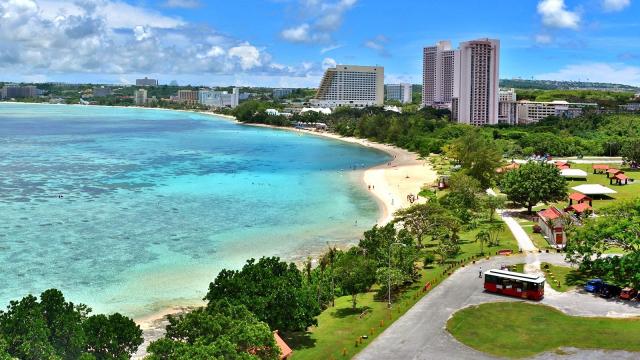The worst thing about playing video games in Australia is that part where you see a cool game, fire it up and remember, “Wait, I’m in Australia and there’s not enough people queuing to get a full lobby.” That’s the reality of being on an island thousands of kilometres away from everywhere else. But an Australian telco is planning to change that, and to do so they’ve enlisted the help of Guam.
Guam, in case you’ve forgotten, is a tiny Micronesian island owned by the United States with a population of just over 166,000. It’s the largest of the Mariana Islands, and has been hugely important over the years as a staging platform for various conflicts.

But now an Aussie telco wants to make Guam known for something a bit different. By having such a central location to a majority of continental Asia, South East Asia and Australia, the Brisbane-based OneQode believes Guam can act as a perfect bridge to connect countries that would ordinarily never meet in a multiplayer server.
The pitch is pretty simple: servers in Guam offer what OneQode is calling a “latency neutral” connection for Taiwan, Hong Kong, Japan, South Korea, the Philippines, Singapore, Russia and Australia, enabling a much larger population to connect to a central point.
In other words: instead of being stuck in Australia with nobody to play with, OneQode is trying to build a future where gamers could connect to servers in Guam, linking with gamers from all over Asia that Australians would never ordinarily play against.

According to a release, the undersea fibre cable connecting guam has been supplied by RTI Cable. RTI Cable recently connected Australia directly to Guam earlier this month, with the international cable connecting directly to the Sunshine Coast International Broadband Network. (RTI also has a direct connection from Tokyo to Sydney that routes through the Guam undersea cable, but that backbone fibre isn’t something regular consumers would utilise just yet.)
OneQode’s idea is that games publishers can start using dedicated servers in Guam, as well as using the region for dedicated esports events and qualifiers for the APAC region. Online qualifiers on more equitable pings, in theory, should lead to fairer games.
“Several APAC eSports tournaments are in the works with a league to follow later in the year,” OneQode announced.
If you have experience within the telco business, you can read through their pitch document to game publishers/server farms here. It’s cool to see a Queensland-based business build something that could have massive consequences for an enormous chunk of gaming across the Asia-Pacific. How much use it’ll have in Australia is unknown: a 63ms hop is a little bit more than Australia to New Zealand, for instance, and when you add the inefficiencies of video game netcode on top, I imagine you could totally end up seeing games with pings of closer to 80ms or higher.
But in context, that’s actually pretty damn impressive. I still remember many games of Counter-Strike where players from Western Australia would get pings of 80ms trying to play teams on the East Coast. However, that’s also why most teams didn’t play teams in Western Australia, opting to practice against New Zealanders and their QLD/NSW/VIC rivals instead. (Sorry, WA.) Those games were still playable, though. Now just imagine you’re not able to play people from Perth, but Taiwan, Singapore, Hong Kong, South Korea … that opens up a massive world of teams and team styles that players would ordinarily never experience.
And Australians have played on much worse pings before. It was super common to experience pings of over 100ms in the early League of Legends and DotA days, when Australians were playing on Singapore-based servers or through third-party platforms like GArena. OneQode’s solution would just be another set of servers you connect to, either directly or automatically depending on the game publisher.
But having a single server location that can service huge chunks of Asia offers a nice amount of scale, one that could potentially fund direct links from Australia to other parts of SEA/APAC later on. And it’s just cool to see another Australian business, and an Australian telco business at that, roll out a big tech idea.
For more info about OneQode’s Guam program, head to the official page here.

Leave a Reply